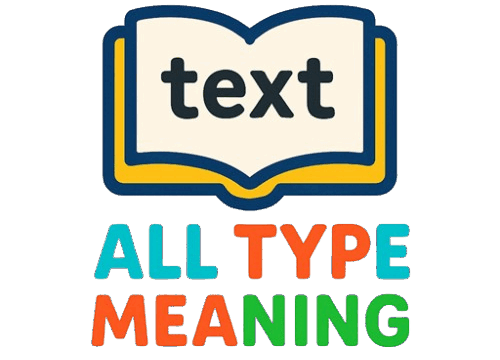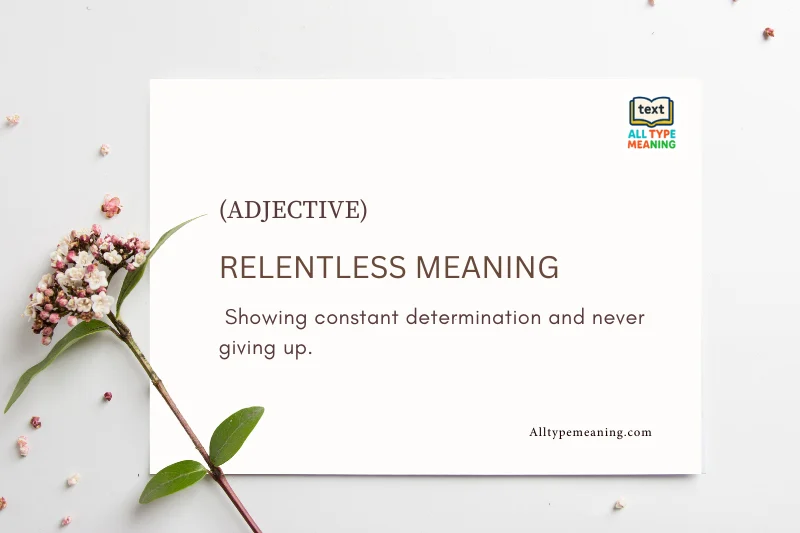Relentless meaning is all about never giving up, no matter how tough things get. It describes a spirit of determination, persistence, and unstoppable energy that keeps going despite challenges. In everyday life, this powerful word captures the mindset of people who push boundaries—whether it’s students striving for success, professionals chasing big goals, or language learners expanding their vocabulary.
Understanding the meaning of “relentless” not only improves your English skills but also helps you express ideas of hard work and perseverance in a clearer, more impactful way. In this guide, we’ll break down the definition, real-life examples, and practical usage so you can use this word with confidence and style.
What Does RELENTLESS Actually Mean?
The word ‘relentless’ meaning is an adjective that describes someone or something that never gives up, stops, or becomes less intense. When we say someone is relentless, we mean they continue their efforts without pause, regardless of obstacles or difficulties they might face.
Primary Relentless Definition:
- Continuing without becoming weaker or giving up
- Showing no mercy or compassion
- Persistent and determined in an unwavering manner
The relentlessly definition follows the same pattern – it means doing something in a relentless manner, without stopping or becoming less intense.
Etymology and Origin 📖
The word “relentless” comes from the combination of “relent” (meaning to become less severe or to give in) and the suffix “-less” (meaning without). So, relentless literally means “without relenting” or “without giving up.”
Simple Examples to Get Started:
- The rain was relentless all day long 🌧️
- She pursued her dreams relentlessly
- His relentless study habits helped him ace the exam
- The team showed relentless determination during the championship
Different Types and Contexts of RELENTLESS
Understanding the relentless meaning becomes clearer when we see how it’s used in different contexts. This powerful word can describe various situations and behaviors.
1. Personal Determination and Effort
When describing human behavior, “relentless” often highlights positive qualities:
- Academic pursuits: “Maria’s relentless study schedule helped her get into her dream university”
- Career advancement: “His relentless work ethic impressed all his colleagues”
- Fitness goals: “Through relentless training, she completed her first marathon”
2. Natural Forces and Phenomena
Nature can be relentless too:
- Weather conditions: “The relentless heat wave lasted for three weeks”
- Natural disasters: “The hurricane brought relentless winds and rain”
- Seasonal changes: “Winter arrived with relentless cold”
3. Negative or Challenging Situations
Sometimes “relentless” describes difficult circumstances:
- Criticism: “He faced relentless criticism from the media”
- Pressure: “The relentless pressure to succeed affected her mental health”
- Competition: “The market competition was absolutely relentless”
4. Mechanical or Technical Contexts
Even machines and systems can be described as relentless:
- Technology: “The relentless pace of technological advancement”
- Processes: “The factory maintained its relentless production schedule”
- Systems: “The computer virus spread with relentless efficiency”
Synonyms and Similar Words: Expanding Your Vocabulary
Learning relentlessly synonym options will help you express similar ideas with variety and precision. Here are the best alternatives:
Strong Synonyms:
- Persistent – continuing firmly despite opposition
- Unwavering – steady and resolute
- Tenacious – holding fast and not giving up easily
- Indefatigable – never getting tired
- Unremitting – never relaxing or slackening
Moderate Synonyms:
- Determined – having a strong will to succeed
- Steadfast – resolutely faithful and loyal
- Constant – occurring continuously
- Continuous – forming an unbroken sequence
- Tireless – having great energy and not needing rest
Context-Specific Synonyms:
- For positive contexts: Dedicated, committed, resolute
- For negative contexts: Ruthless, merciless, harsh
- For natural phenomena: Unceasing, perpetual, endless
Quick Comparison Table:
| Word | Intensity Level | Best Used For |
|---|---|---|
| Relentless | Very High | All contexts |
| Persistent | High | Personal efforts |
| Determined | Medium-High | Goals and ambitions |
| Constant | Medium | Ongoing situations |
| Tireless | High | Work and effort |
Real-Life Examples and Usage in Different Fields
Understanding how to use “relentless” and “relentlessly” in real situations will make your communication more effective and impactful.
Business and Professional World 💼
- The startup founder’s relentless pursuit of innovation perfectly captures the relentless meaning in the business world
- “Our team worked relentlessly to meet the project deadline”
- “The company faced relentless competition from new market entrants”
- “She relentlessly networked to build her professional connections”
Sports and Athletics 🏆
- “The athlete’s relentless training regime paid off with an Olympic gold medal”
- “The team played relentlessly throughout all four quarters”
- “His relentless defense frustrated the opposing team’s offense”
- “She relentlessly pursued every ball during the tennis match”
Education and Learning 🎓
- “The student’s relentless dedication to studying impressed all her teachers”
- “He relentlessly practiced mathematics until he mastered every concept”
- “The researcher showed relentless commitment to finding a solution”
- “Her relentless curiosity led her to explore multiple academic fields”
Entertainment and Media 🎬
- “The director’s relentless attention to detail created a masterpiece”
- “The journalist relentlessly investigated the corruption scandal”
- “The actor prepared relentlessly for his challenging role”
- “The band’s relentless touring schedule built them a massive fanbase”
Technology and Innovation 💻
- “The programmer worked relentlessly to fix the critical bug”
- “Innovation in AI continues at a relentless pace”
- “The team relentlessly tested the new software for any issues”
- “Market demands for faster technology create relentless pressure on developers”
Tips for Using RELENTLESS Effectively in Your Communication
Writing Tips:
- Context Matters: Make sure the intensity of “relentless” matches your situation
- Avoid Overuse: This powerful word loses impact if used too frequently
- Consider Your Audience: Ensure your readers understand the strength of this word
- Balance Tone: “Relentless” can sound either admirable or overwhelming
Speaking Tips:
- Emphasize Properly: Give the word appropriate stress when speaking
- Use Gestures: Physical emphasis can strengthen the word’s impact
- Pause Effect: A brief pause before or after can add dramatic effect
- Match Your Tone: Ensure your vocal tone matches the word’s intensity
Academic Writing:
- “The researcher’s relentless methodology ensured comprehensive data collection”
- “Historical evidence shows relentless social changes during this period”
- “The study employed relentless fact-checking procedures”
Creative Writing:
- “The storm was relentless, pounding the shore with merciless waves”
- “Her relentless pursuit of truth drove the entire plot forward”
- “Time moved relentlessly toward the inevitable confrontation”
Professional Communication:
- “Our team maintains a relentless focus on customer satisfaction”
- “We’re committed to relentless improvement in all our processes”
- “The market requires relentless innovation to stay competitive”
Conclusion:
The term ‘relentless meaning’ signifies steadfast determination and persistent effort in the face of obstacles. This blog delves into its definition, etymology, synonyms, antonyms, practical examples, and advice for effective application in both writing and speech. For more interesting word insights, don’t miss our article on Coxer Meaning for a deeper dive into another unique term.
Frequently Asked Questions
1. What’s the difference between “persistent” and “relentless”?
Answer: While both words describe continued effort, “relentless” is much stronger and more intense. “Persistent” suggests steady, ongoing effort, while “relentless” implies an almost unstoppable, unwavering force. For example, someone might be persistent in asking questions, but relentless pursuit suggests they won’t accept any obstacles or delays. 🎯
2. Can “relentless” have negative connotations?
Answer: Absolutely! While “relentless” often describes admirable determination, it can also describe unwelcome or harsh situations. For instance, “relentless criticism” or “relentless pressure” suggests something overwhelming and potentially harmful. The context determines whether it’s positive or negative. ⚖️
3. How do you pronounce “relentless” correctly?
Answer: “Relentless” is pronounced as “ri-LENT-ləs” with the stress on the second syllable. The “relentlessly” pronunciation follows as “ri-LENT-ləs-lee.” Practice saying it slowly first, then speed up as you become more comfortable. 🗣️
4. What are some antonyms (opposite words) of “relentless”?
Answer: Great antonyms include: merciful, lenient, forgiving, intermittent, sporadic, gentle, yielding, and flexible. For example, instead of “relentless criticism,” you might have “gentle feedback” or “intermittent suggestions.” These opposites show compassion and flexibility rather than intensity. 🔄
5. Is it better to use “relentless” or “relentlessly” in formal writing?
Answer: Both have their place! Use “relentless” as an adjective to describe nouns (“relentless effort”), and “relentlessly” as an adverb to describe actions (“worked relentlessly”). In formal writing, consider your sentence structure and what you’re trying to emphasize – the thing itself or the action being performed. 📝
Explore more word meanings and vocabulary insights at All Type Meaning your go-to source for mastering language skills effortlessly! 📚

